
Does Bong Water Filter Out THC?
Many stoners awake in a cold sweat, wondering if their next-gen weed was rendered impotent by the THC-trapping qualities of their bong water. They reach for the bong to quell that fear, but wonder, are you working against me? Read on to find out why this fear is unfounded, how to work out exactly how much THC is being robbed, and sleep well!
Bong water is great. It’s actually quite disgusting, but what would we do without it? Many throats are saved by its simple cooling and filtering properties. But what does it filter out? And, does it remove any precious THC from your hits? The answer is convoluted.
Below, we go into detail on exactly what is happening when THC in gas form comes into contact with water, and whether this ultimately reduces the overall potency of your hit. We even give you the necessary information to figure this out yourself, if you really need to know.
What Is the Purpose of Water in a Bong?
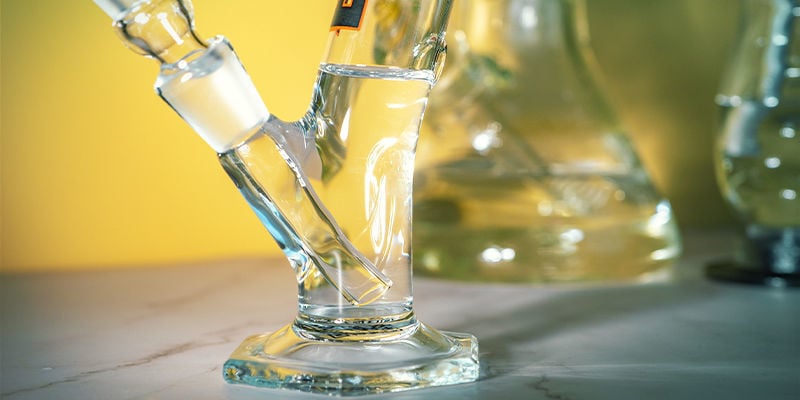
Water in your bong serves to support a cleaner, smoother smoke. It achieves this in a twofold manner. Primarily, by passing through cool water, the temperature of the smoke is lowered significantly. Therefore, it is less aggressive to inhale. The water also traps soluble compounds in the smoke (and, as it turns out, insoluble ones). This essentially filters the smoke, again making for a cleaner hit.
Bong water also traps larger particles, such as ash and plant matter. These particles cause particular irritation in the throat and lungs, as they are large and very hot. So, by removing them, you’re doing yourself a favour.
It seems that bong water may also remove some unwanted toxins from the smoke too, but not in any huge amounts. Certainly not enough to consider it healthier than any other methods of inhaling smoke. As always, if you’re concerned about the effects of smoke, find another method of ingestion!
Water filtration should be used as a means to improve the quality of your smoking experience, and it is very effective at this. However, do not fool yourself into thinking you’re avoiding the bad side effects of smoke inhalation.
Does Bong Water Filter Out THC?
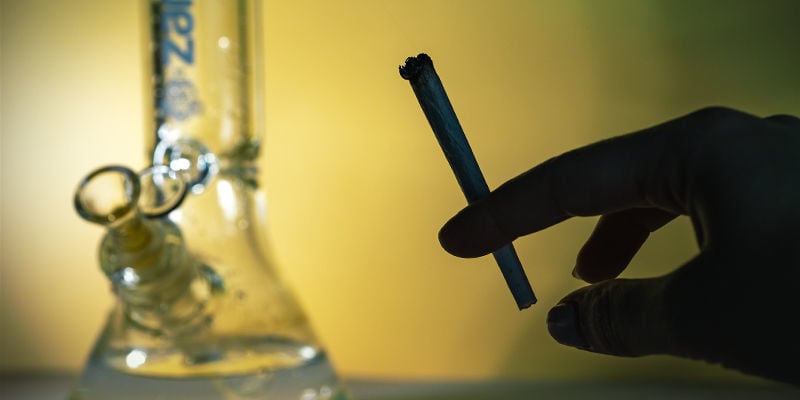
Technically, yes. Practically, no. While water does trap a small amount of insoluble THC, the amount is so negligible that it won’t affect your high. What’s more, it’s still a far more efficient way of smoking weed than in a spliff/joint, where much more is lost as it burns.
For those interested in this process, there are more details below. What follows is simply an explanation of the basic answer, but it will detail the processes necessary to work out how much THC is lost in each of your bong hits—provided you know a few simple details about your setup.
In case you don’t want to figure this out, though, the short answer is: not much!
How To Figure Out How Much THC Is Filtered By Bong Water
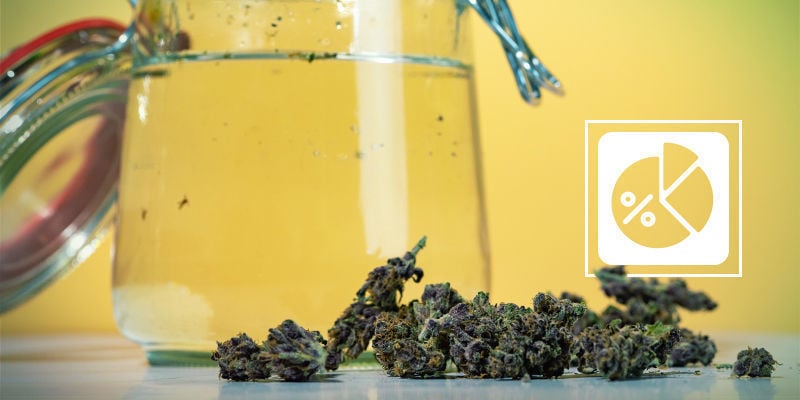
We need to consider a few variables to figure out how much THC is lost to our bong water. The first is the THC content of the weed itself. So, if it’s 10%, there is 100mg of THC per gram of weed. This is fairly simple maths.
The second, then, is how much weed we are putting in the bowl. Percentages stay the same, so just work out 10% (or whatever the potency is) of your given weight.
We also need to know how many millilitres of water there are in the chamber of the bong. This is important, as there is a maximum solubility of THC per litre of water.
Temperature and atmospheric pressure within the bong are also important, but it is unlikely you can measure these yourself. So, for the purpose of ease, it’s safe to go with 100°C and 80% of the Earth's normal atmospheric pressure (or 0.8 atm), respectively.
How Much THC Is in a Typical Bong Rip?
Let’s assume you love getting high, and pack your bong with a 30% THC strain. Let’s also assume, for ease, that you’re a massive legend and smoke 1 gram bong hits at this strength. So, in one bong hit, you have 300mg of THC.
How Much THC Can Water Trap?
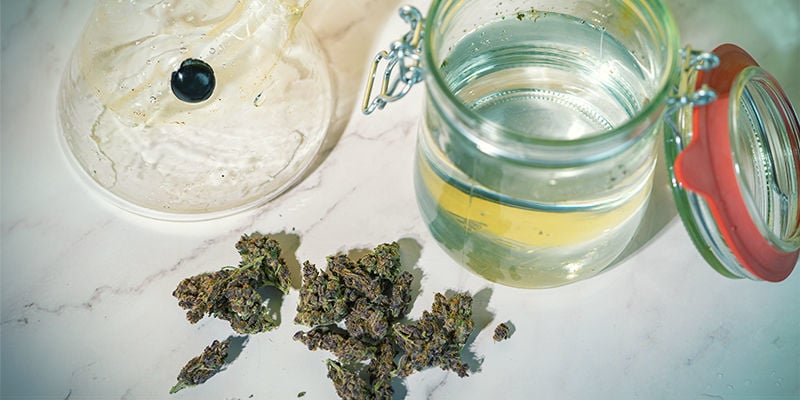
It seems that THC has a maximum water solubility of about 2.8mg per litre (of water), at a temperature of 23°C. So, if you had 500ml of water in your bong, it would trap 1.4mg of THC, which means you’d be inhaling 298.6mg of THC.
Or would you? THC, like many compounds, becomes less soluble as temperature increases. So, while these numbers are given at 23°C, a bong hit is likely to sit at around 100°C, and thus the solubility will be significantly less.
At 23°C, THC will be a solid, crystalline form. At 100°C, it will be a gas. Gas is less soluble than solids. Henry’s law states that as temperature in gas increases, solubility decreases.
It gets even better. As we are inhaling, we are reducing the atmospheric pressure within the bong chamber. Let’s say it drops to around 80% of normal atmospheric pressure. This works in our favour too. Due to the lower pressure, and the universe's desire for equilibrium, more of the gas will escape from the water to avoid a vacuum being created in the chamber. So even less THC will be trapped in the water.
How Do Those Numbers Compare?
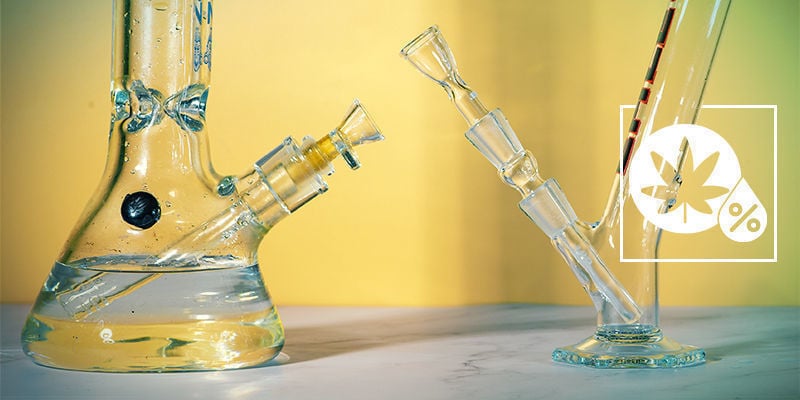
It is probably safe to assume that less than 1% of your THC is lost to your bong water—even less considering most bongs take less than a litre. In other words, you’ll be getting over 299mg of your beloved THC using our example.
In short, it is unlikely to wreck your high. When you consider the alternative—hitting a bong without any water—you’ll probably decide that this minor sacrifice is well worth it!
- (n.d.). Physicochemical Properties, Solubility, and Protein Binding of Δ9 -Tetrahydrocannabinol - https://jpharmsci.org
- Contributors to Wikimedia projects. (2003-06-01T05:44:25Z). Henry's law - Wikipedia - https://en.wikipedia.org
-
 6 min
September 5, 2023
How To Use A Bong
Bongs might look threatening, but they're actually fairly easy to master (if you can get past the coughing). Learn all about how to use a bong here!
6 min
September 5, 2023
How To Use A Bong
Bongs might look threatening, but they're actually fairly easy to master (if you can get past the coughing). Learn all about how to use a bong here!
-
 5 min
December 2, 2021
What Are The Benefits Of Using A Bong?
If you're reading this, you're likely one of the many herb-loving individuals who stands steadfast by their bong. Lucky for you, this smoking method has many benefits, ranging from the functional...
5 min
December 2, 2021
What Are The Benefits Of Using A Bong?
If you're reading this, you're likely one of the many herb-loving individuals who stands steadfast by their bong. Lucky for you, this smoking method has many benefits, ranging from the functional...
-
 6 min
October 21, 2021
Top 10 Best Glass And Acrylic Bongs
Looking for a good bong? We can help! Here is our list of the 10 best glass bongs and acrylic bongs for every stoner's taste and budget!
6 min
October 21, 2021
Top 10 Best Glass And Acrylic Bongs
Looking for a good bong? We can help! Here is our list of the 10 best glass bongs and acrylic bongs for every stoner's taste and budget!
-
 6 min
May 2, 2021
What Is An Ice Bong?
In the world of bongs, there is an incredible assortment of high-tech, expensive, and sometimes over-the-top solutions to a simple problem: ripping bongs can hurt! But, as we all know, often the...
6 min
May 2, 2021
What Is An Ice Bong?
In the world of bongs, there is an incredible assortment of high-tech, expensive, and sometimes over-the-top solutions to a simple problem: ripping bongs can hurt! But, as we all know, often the...






 United States
United States










